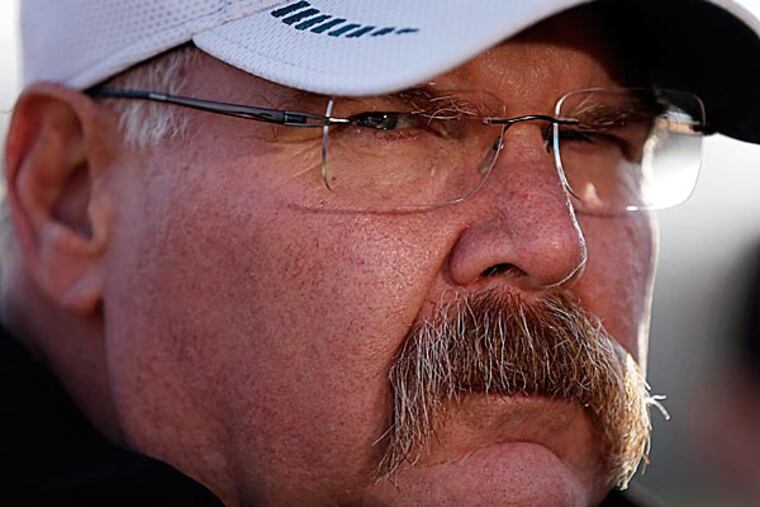With Eagles' season done, Andy Reid making bold moves
When Andy Reid says he hasn't "gone there" - hasn't stopped to reflect upon what may be the final weeks of his 14-year tenure - it's easy enough to believe him. It is in the nature of football lifers to focus only on the task at hand.

When Andy Reid says he hasn't "gone there" - hasn't stopped to reflect upon what may be the final weeks of his 14-year tenure - it's easy enough to believe him. It is in the nature of football lifers to focus only on the task at hand.
Still, something about these final days has proven liberating to Reid. He is free from the pretense and agendas that influence roster and staff decisions at virtually every professional sports franchise. He can just do what seems right, regardless of how it makes him or the rest of the organization look.
That's why Nate Allen will be watching Colt Anderson play his position Sunday against Washington. It is why Jim Washburn is cursing at his TV instead of his defensive linemen, why Jake Scott was able to walk in off the street and replace Danny Watkins at right guard.
The lesson is obvious. One reason new coaches have an immediate impact is they have nothing invested in the roster. Those busted draft picks and underachieving, overpaid free agents and ill-fitting coaches? They were all somebody else's idea, and are all easily released, benched, or fired.
When Reid became head coach of the Eagles in 1999, he was able to evaluate Ray Rhodes' 3-13 squad with a clear eye. He and defensive coordinator Jim Johnson correctly identified the core defenders worth building around. On the offensive side, Reid started virtually from scratch.
The result was a team that improved every year and finally crested in 2004.
It is much harder to maintain that clear-eyed objectivity about the players you draft and sign, and about the coaches you hire. Indeed, the more controversial or unusual the move, the harder it is to admit it was a mistake. Those clear eyes become clouded with pride and stubbornness and a determination to prove you were right.
It helps, of course, if you're right in the first place. The best teams are right more often than the lesser teams, obviously. But it's nearly as important to be ruthlessly honest about your players, regardless of whether they were first-round picks or undrafted free agents.
When the Eagles took Watkins in the first round in 2011, he was touted as an immediate starter. His advanced age - Watkins turned 27 during his rookie year - was actually an advantage, Reid and general manager Howie Roseman assured us. Watkins was a natural.
It took well into this season, and a nebulous ankle injury that is or isn't chronic, for Watkins to be benched. Since Scott walked off the street and into the starting right guard spot, the offensive line has been markedly better.
The defensive line has similarly improved since getting rid of Washburn and his pet, defensive end Jason Babin. In this case, a Reid/Roseman draft pick has benefited from the change. Brandon Graham has played the way the Eagles said he would when they traded up to draft him. That makes it all the more puzzling that he was blocked by Babin and Washburn. Keep an eye on Vinny Curry, a second-round draft pick this year. He has also been set free by the firing of Washburn.
Allen is an especially tough case for the Eagles. He was taken with the second-round pick obtained in the Donovan McNabb trade. So he represented value for McNabb as well as an attempt to fill the safety void left by the departure of Brian Dawkins.
After a promising start, Allen injured his knee in 2010. He hasn't looked the same since. This year, he has been a featured player in a secondary that is embarrassingly soft and remarkably disorganized. In announcing Allen's demotion, Reid said that Anderson, an undrafted specialteamer plucked from the Vikings' practice squad, is better against the run.
To these ears, that sounds very much like: We're going with the guys who play tough.
It took until late December, with the season already wasted, to get there. You can't help thinking things might have been different if Reid had been ready in the offseason to acknowledge that Allen and Babin and Watkins and Washburn were mistakes.
We can only wonder.